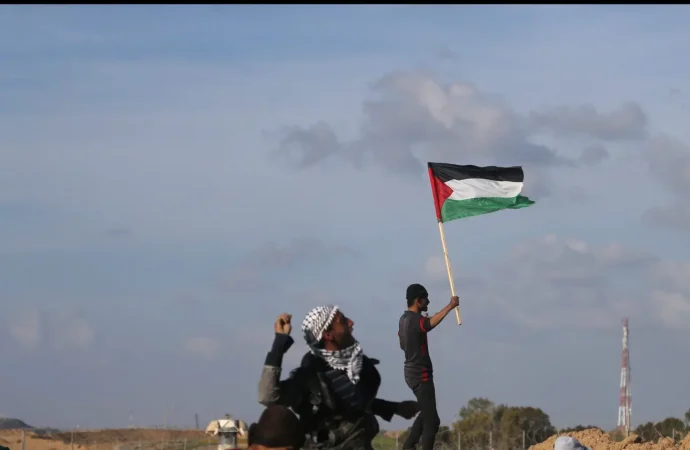Author Recent Posts Zainab Nasir Latest posts by Zainab Nasir (see all) Significance of US led Gaza Peace Plan – October 7, 2025 What needs to change in Pakistan’s fight against Terror? – September 10, 2025
The Gaza war has once again captured the world’s attention, with horrifying photos of civilians suffering dominating world headlines. In response, the United States has come forward with a peace plan that promise to bring humanitarian relief, rebuild the devastated infrastructure of Gaza, and set out a political course of action. On paper, this U.S. drafted Gaza Peace Plan is a pivotal opportunity to end the cycle of violence. But the question arises, is this a true turning point toward peace, or another diplomatic illusion?
The humanitarian crisis is real as United Nations estimates that more than 30,000 Palestinians have died, and close to half were women and children. Over 70 percent of Gaza’s 2.3 million inhabitants are displaced, staying in temporary shelters, schools, or plastic tents. Parents are finding it difficult to feed their children, while hospitals lack basic medicine such as painkillers and antibiotics. According to the World Health Organization, more than 60 percent of Gaza’s hospitals are not operating. These are not statistics they are stories about family destroyed and futures erased. Under such circumstances, the threat of aid corridors and billions of dollars of international aid is not only significant it is a lifeline. Unless assistance arrives quickly, Gaza may be confronted with a catastrophe that individuals across the globe will repent and think about for years to come.
On the other hand, aid and rebuilding will not stop the bloodshed. The political side is where strategy faces its biggest challenge. Israel’s longest-ruling leader, Prime Minister Benjamin Netanyahu, has never yielded to outside pressure for concessions. Netanyahu’s administration insists on Israel’s “absolute right to defend itself,” and peace plans without Hamas’ complete disarmament are ruled out swiftly. In reality, this means that Washington prioritizes humanitarian assistance while Netanyahu enacts a military-first agenda because he believes only force can secure the safety of Israel. Furthermore, he is under intense pressure from his hardline coalition, which was raised on hardline policies and views concessions as weakness. To his political allies, even minor humanitarian gestures to Palestinians seem as dangerous steps toward legitimizing their cause. This internal political reality ensures that it is not probable that Netanyahu will wholeheartedly endorse the U.S. vision regardless of how well-intentioned it is.
The regional dynamics further complicate the equation. Arab nations such as Egypt and Qatar have also been actively mediating between Israel and Palestinian factions, whereas Saudi Arabia has explicitly declared that normalization with Israel is impossible except in the event of substantial Gaza progress. The conflict could spill over into Lebanon, where fighting against Hezbollah would pose an extra front. To most Arab nations, the U.S. proposal is not merely peace but also a test of whether America can be fair to Palestinians rather than always standing up for Israel. The U.S. has indeed attempted to use its power, extending $3.8 billion per annum in military assistance to Israel and over $1 billion in humanitarian assistance to Palestinians since 2021. Yet absent a change in Israeli leadership’s commitment to compromise, these measures threaten to prove cosmetic, not revolutionary. Indeed, Netanyahu’s intransigence may ultimately isolate Israel diplomatically, particularly as worldwide demands for accountability and justice become more shrill.
This is where leadership by Washington comes in. If the U.S. simply presents this plan as just another ceasefire effort, it will be a failure like so many others Oslo, Camp David, or even the more recent Abraham Accords that avoided the Palestinian issue altogether. But if the U.S. uses its influence on Netanyahu and demands responsibility, open aid for Gaza, and a clear political plan, then this peace effort might succeed where others failed. America should not only act as Israel’s protector in the UN by blocking resolutions against it. It also needs to act as a real peacemaker, showing Palestinians that their suffering is seen and that their dreams matter just as much as Israel’s security.
To my view, the value of the U.S.-brokered Gaza Peace Plan is in its ability to bring to light the disparity between words and actions. For Palestinians, it is a hope for survival, for dignity, and for the possibility of living without the threat of shelling. For Israelis, it is a chance to reconsider policies that have secured military control but greater diplomatic isolation. It is a test for the U.S. as to whether it will continue to pursue its outdated unilateral policies or become an actual advocate of peace and justice at last.
- Significance of US led Gaza Peace Plan - October 7, 2025
- What needs to change in Pakistan’s fight against Terror? - September 10, 2025





















Leave a Comment
Your email address will not be published. Required fields are marked with *